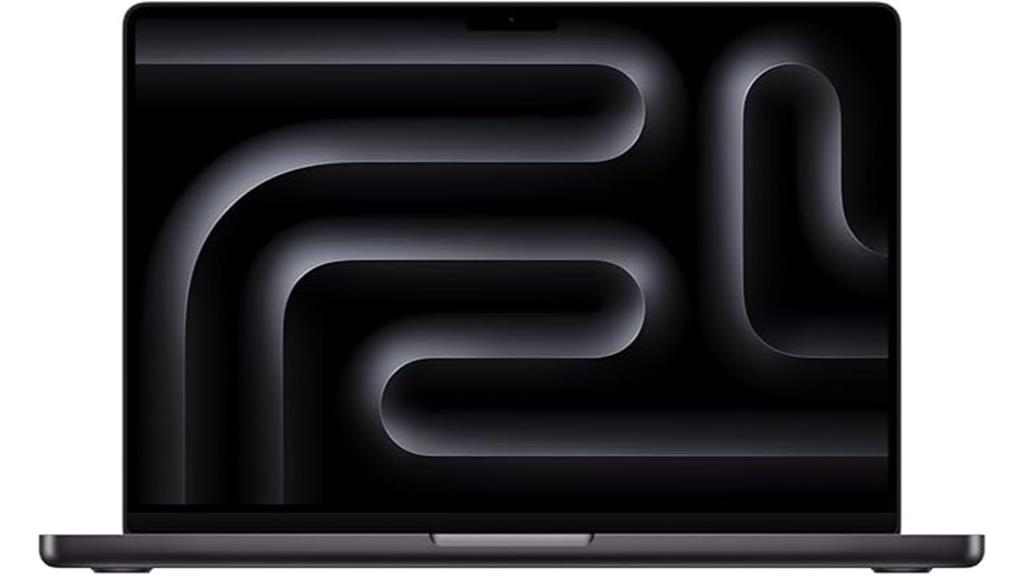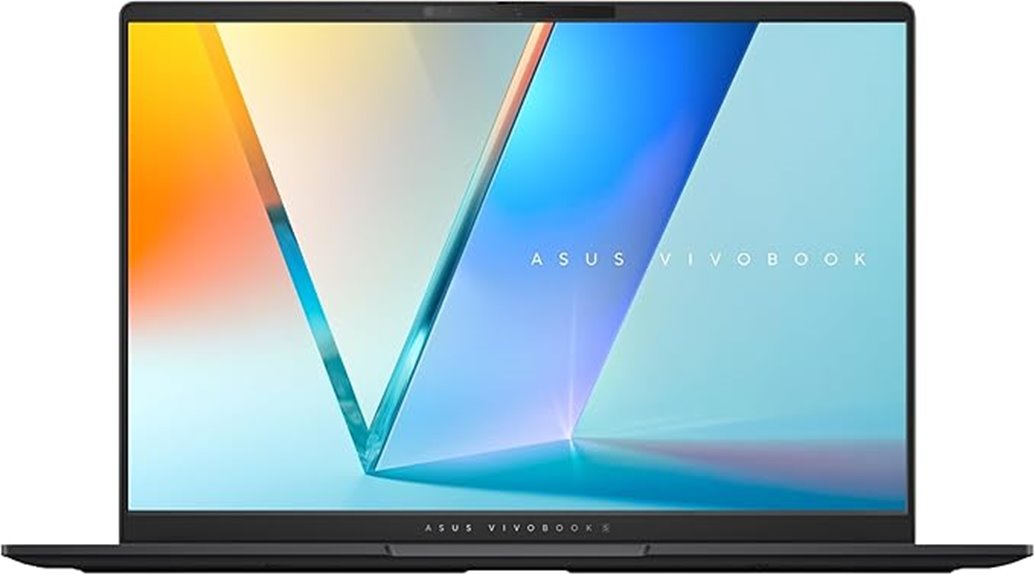Best Laptop for Researchers (Top 5 Picks for 2025)
If you’re a researcher in 2025, you need a laptop that’s powerful and portable. Look for options like the Apple 2024 MacBook Pro with an M4 chip, Acer Swift X 14, or the Apple 2025 MacBook Air. These models offer high RAM, fast SSDs, and impressive battery life, plus sharp displays for your data. Make sure to consider connectivity and weight too. Stick around for a closer look at each of these top choices.
In the interest of full disclosure, we would like to inform you that some links on our website are affiliate links. By clicking on these links and completing a purchase from our partners, we may receive a nominal commission at no extra cost to you. Rest assured, our affiliate partnerships do not compromise the integrity of our editorial content or product evaluations. For further clarification, kindly refer to our comprehensive affiliate disclosure.
Table of Contents
What Are the Best Laptop for Researchers to Buy This Year?
Here are my top picks for the best laptop for researchers, you can consider this year.
Apple MacBook Pro Laptop with M4 chip (14.2-inch Liquid Retina XDR Display)
For researchers who demand top-tier performance and efficiency, the Apple 2024 MacBook Pro with the M4 chip is an outstanding choice. Its 10-core CPU and GPU ensure exceptional speed for multitasking and running productivity apps, while the all-day battery life keeps you powered, whether you’re plugged in or not. The stunning 14.2-inch Liquid Retina XDR display boasts peak brightness of 1600 nits and a contrast ratio of 1,000,000:1, delivering vivid visuals for your work. Plus, seamless integration with Apple’s ecosystem enhances your experience, making it compatible with essential applications like Microsoft 365 and Adobe Creative Cloud.
Best For: Researchers and professionals who require high performance, exceptional display quality, and seamless integration with Apple’s ecosystem.
Pros:
- Exceptional performance with a powerful 10-core CPU and GPU for demanding applications.
- Stunning visuals from the 14.2-inch Liquid Retina XDR display with impressive brightness and contrast.
- Long battery life for all-day productivity, whether plugged in or on the go.
Cons:
- Higher price point compared to other laptops in its category.
- Limited upgrade options for memory and storage after purchase.
- Compatibility issues with some non-Apple software or peripherals.
Acer Swift X 14 Laptop (SFX14-72G-77NJ)
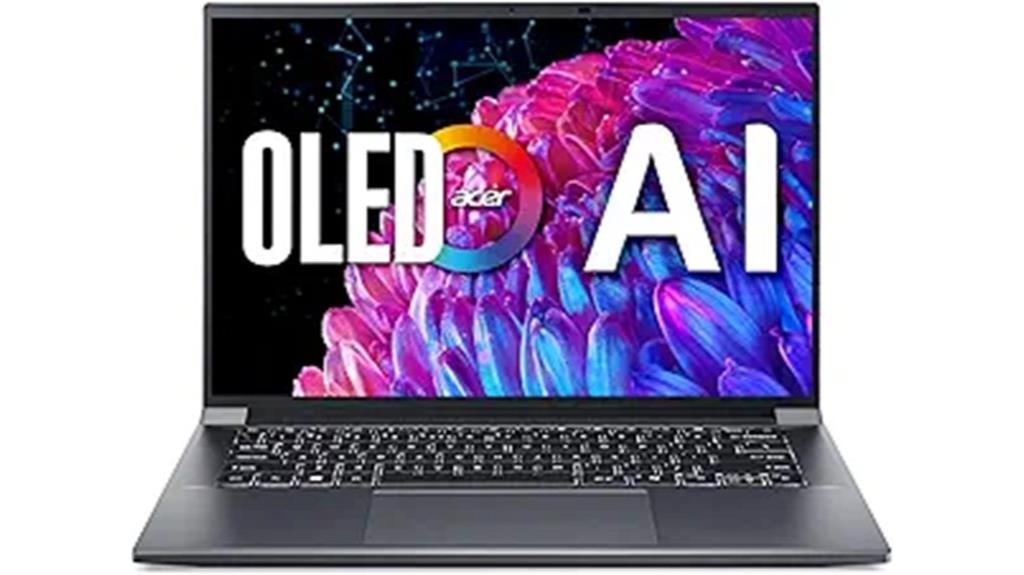
The Acer Swift X 14 Laptop (SFX14-72G-77NJ) stands out as an ideal choice for researchers who demand high performance without compromising on portability. With an Intel Core Ultra 7 processor and NVIDIA GeForce RTX 4060 GPU, it handles demanding applications effortlessly. The stunning 14.5-inch OLED display offers vibrant colors and reduced eye strain, while AI features enhance multitasking through Windows Copilot. You’ll appreciate the 1080p webcam for clear video calls and the 16GB memory paired with a 1TB SSD for speedy storage. Plus, with robust connectivity options, you can easily stay connected, no matter where your research takes you.
Best For: Researchers and creators seeking high performance, portability, and advanced AI features in a laptop.
Pros:
- Exceptional processing power with Intel Core Ultra 7 and NVIDIA GeForce RTX 4060 for demanding applications.
- Vibrant 14.5-inch OLED display with a high resolution and TÜV Rheinland certification for reduced eye strain.
- Comprehensive connectivity options including Killer Wireless Wi-Fi 6E and Bluetooth 5.3 for seamless online experiences.
Cons:
- The 14.5-inch screen may be smaller for those who prefer larger displays for multitasking.
- Premium features may come at a higher price point compared to standard laptops.
- Limited upgradability options due to soldered RAM in the design.
Apple 2025 MacBook Air 15-inch Laptop with M4 Chip
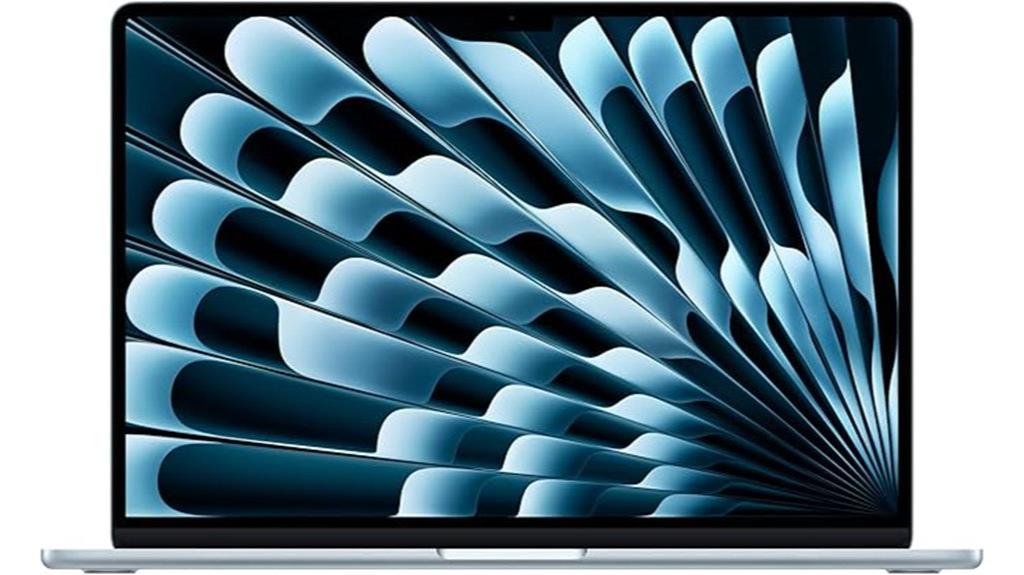
If you’re a researcher seeking a powerful yet portable laptop, the Apple 2025 MacBook Air 15-inch with the M4 chip stands out for its impressive performance and battery life. With the M4 chip, you’ll enjoy fluid multitasking, video editing, and even gaming. The stunning 15.3-inch Liquid Retina display brings your projects to life, showcasing rich colors and sharp details. Plus, the 12MP Center Stage camera and Spatial Audio provide top-notch visuals and sound quality for virtual meetings. With robust privacy features and connectivity options like Thunderbolt 4 and Wi-Fi 6E, this MacBook Air is perfect for any research environment.
Best For: Researchers and professionals who need a powerful, portable laptop for multitasking, video editing, and virtual meetings.
Pros:
- Enhanced performance with the M4 chip, ideal for demanding tasks.
- Stunning 15.3-inch Liquid Retina display for vibrant visuals and sharp details.
- Long battery life of up to 18 hours for all-day productivity without interruptions.
Cons:
- Higher price point compared to some other laptops on the market.
- Limited upgrade options post-purchase due to soldered components.
- May lack some specialized ports that certain professionals might require.
ASUS Vivobook S 14 OLED Slim Laptop (M5406WA-DS76)
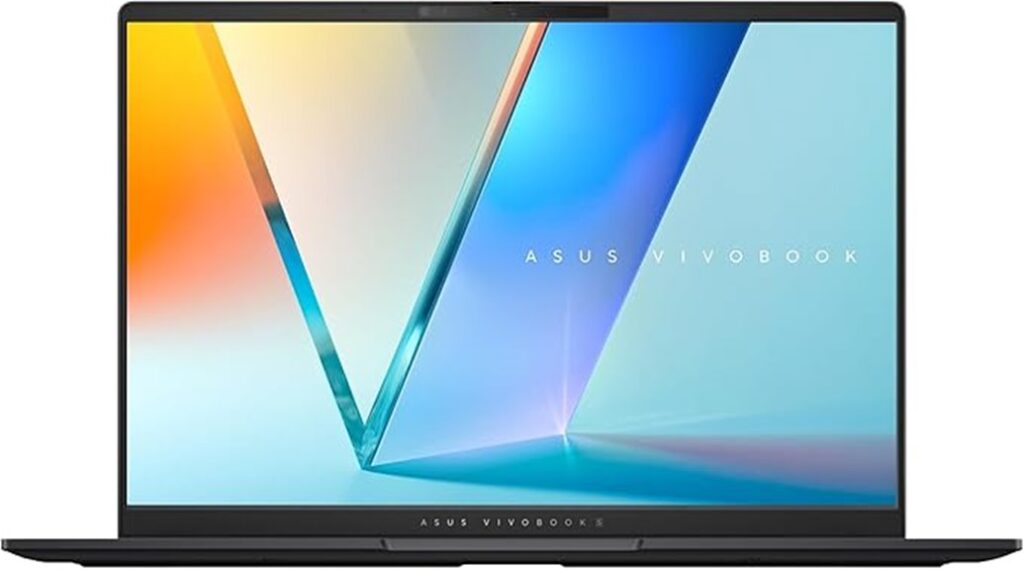
Researchers seeking a powerful yet portable laptop will find the ASUS Vivobook S 14 OLED Slim Laptop (M5406WA-DS76) an exceptional choice. Its AMD Ryzen 9 365 processor and 24GB of LPDDR5X RAM ensure top-notch performance for multitasking and demanding applications. The stunning 14” 3K OLED display with 120Hz refresh rate delivers vibrant visuals, while its lightweight design at just 2.87 lbs makes it easy to carry. You’ll appreciate the customizable RGB backlit keyboard for comfortable typing. With ample connectivity options, including multiple USB ports and HDMI, this laptop is perfect for your research needs on the go.
Best For: Researchers and professionals seeking a powerful, portable laptop for multitasking and demanding applications.
Pros:
- Outstanding performance with AMD Ryzen 9 365 processor and 24GB LPDDR5X RAM for seamless multitasking.
- Stunning visuals provided by a 14” 3K OLED display with a 120Hz refresh rate and high brightness.
- Lightweight and portable design at only 2.87 lbs, making it easy to carry for on-the-go use.
Cons:
- Limited storage capacity with only a 512GB SSD, which may not be sufficient for extensive data storage needs.
- Single-zone RGB backlighting may not offer the customization options some users desire.
- Potentially high price point for those on a tight budget seeking a mid-range laptop.
Samsung Galaxy Book4 Pro Business Laptop (NP944XGK-KG4US)
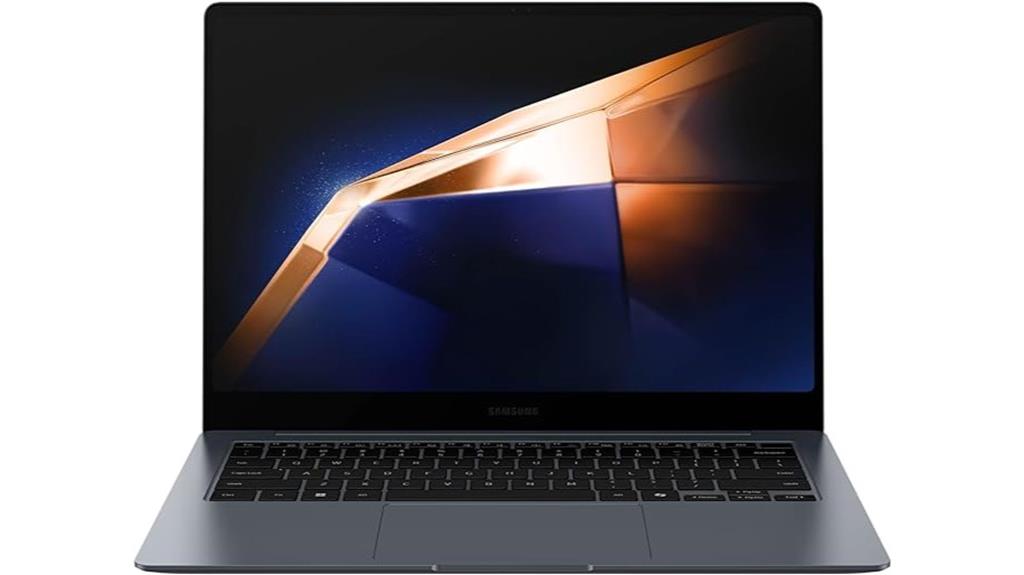
For professionals seeking a powerful yet portable solution, the Samsung Galaxy Book4 Pro Business Laptop (NP944XGK-KG4US) stands out with its impressive Intel Core Ultra 7 processor and vibrant 3K AMOLED touchscreen. Weighing just 2.71 lbs, it’s designed for on-the-go productivity. With 32GB of RAM and a 1TB SSD, multitasking and storage aren’t an issue. You’ll appreciate the 8-hour battery life and fast charging, perfect for busy days. Its sleek design and comprehensive connectivity, including Thunderbolt 4 ports, enhance your workflow. Plus, Samsung Knox keeps your data secure, ensuring peace of mind while you work.
Best For: Professionals who require a powerful, portable laptop with exceptional display quality and robust security features for multitasking and productivity on the go.
Pros:
- Lightweight and portable design at only 2.71 lbs, making it easy to carry for on-the-go use.
- High-performance Intel Core Ultra 7 processor and 32GB of RAM, ideal for multitasking and demanding applications.
- Vibrant 3K AMOLED touchscreen display with anti-reflective features, providing excellent clarity and visuals.
Cons:
- Higher retail price compared to competitors, which may deter budget-conscious buyers.
- Limited RAM upgrade options in certain regions, restricting future-proofing for users who may need more memory.
- Perceived low quality of the OEM SSD from Western Digital, which may not meet expectations for a premium product.
READ MORE: Best Laptop for Influencers, Best Laptop for Excel Spreadsheets, Best Laptop for Dropshipping Busines, Best Laptop for Data Science Students, Best Laptop for Data Engineer, Best Laptop for Blogging and Podcasting, Best Laptop for Dental School, Best Laptop for Grandma, Best Laptop for Full Stack Developer, Best Laptop for Fruity Loops
Factors to Consider When Choosing the Best Laptop for Researchers
When choosing a laptop for your research needs, you’ll want to consider several key factors. Performance and processing power are crucial for handling demanding tasks, while display quality enhances your viewing experience. Don’t overlook battery life, portability, and connectivity options, as these features can significantly impact your workflow.
Performance and Processing Power
Choosing the right laptop can significantly impact your research productivity, especially when it comes to performance and processing power. Focus on a high-performance, multi-core CPU to enhance multitasking and speed up data processing. A dedicated graphics processing unit (GPU) is essential for handling graphically intensive applications and simulations, ensuring smooth operation during complex tasks. Aim for a minimum of 16GB of RAM to efficiently manage large datasets and run multiple applications without lag. Opt for solid-state drives (SSD) with at least 512GB of storage for quicker data access, crucial for dealing with large files. Lastly, consider battery life; choose laptops that provide at least 8 hours of usage on a single charge to support your long research sessions.
Display Quality and Resolution
While you might prioritize processing power and performance in your search for the perfect research laptop, display quality and resolution are equally important for productivity. A higher resolution, like 3K or 4K, sharpens images and enhances detail, crucial for tasks like data visualization. Plus, a display with a 120Hz refresh rate offers smoother motion, making video playback and scrolling more enjoyable. Consider peak brightness levels—around 1600 nits—for better visibility in bright settings. Color accuracy, ideally at 100% DCI-P3, ensures true-to-life colors, vital for design or photography work. Lastly, an aspect ratio of 16:10 provides ample vertical space for multitasking, boosting your efficiency when handling documents and spreadsheets.
Battery Life and Efficiency
As you dive into research, battery life and efficiency become essential considerations, especially if you often find yourself working in remote locations. Many laptops offer between 8 to 18 hours of use on a single charge, so you’ll want one that meets your needs. Look for models with high-capacity batteries rated above 60Wh for demanding applications, allowing you to work longer without frequent recharging. Efficient power management features, like advanced processors and optimized software, can significantly extend battery life. Fast charging capabilities also help reduce downtime, letting you quickly recharge during short breaks. Additionally, consider laptops with energy-efficient components, such as SSD storage and low-power displays, to enhance overall battery efficiency and longevity.
Portability and Weight
When you’re on the hunt for a laptop that fits your research needs, portability and weight should be high on your list of priorities. Aim for a device weighing under 3 pounds, making it easier to transport during fieldwork or your daily commute. A slim profile, ideally around 0.6 inches thick, enhances portability and lets it slip easily into bags or backpacks. Extended battery life, ideally up to 18 hours, is vital to reduce the need for frequent charging during long research sessions. Additionally, a lightweight design should be combined with a durable build to withstand wear and tear. Finally, ensure the laptop’s dimensions allow for comfortable use in various environments, like small desks, coffee shops, or libraries.
Connectivity Options Available
Connectivity options are crucial for researchers, ensuring you can seamlessly integrate various devices into your workflow. When choosing a laptop, look for multiple USB ports, both Type-A and Type-C, to accommodate different peripherals. Thunderbolt 4 ports are a must for high-speed data transfer and connecting multiple displays or accessories. Additionally, having HDMI or Mini DisplayPort makes it easy to connect to projectors or external monitors for presentations. A microSD card reader can save you time when transferring data from cameras used in research. Lastly, prioritize wireless options like Wi-Fi 6E and Bluetooth 5.3 for enhanced connectivity, ensuring you stay connected to networks and devices with speed and reliability.
Operating System Compatibility
Choosing the right operating system for your laptop can significantly influence your research efficiency. You’ll want to ensure compatibility with essential software applications like data analysis tools and statistical packages, which can vary among Windows, macOS, and Linux. Some applications perform better on specific systems, impacting your workflow. Additionally, consider collaboration tools; ease of file sharing and communication can differ, especially when working with colleagues on different platforms. Security features are crucial too; robust measures protect sensitive research data, so evaluate how well each OS integrates with security software. Finally, your familiarity with an operating system can boost productivity, so choosing one you’re comfortable with is key to enhancing your research experience.
Price and Value Proposition
Finding the right laptop for your research can often come down to understanding the price and its value proposition. Evaluate each option by comparing its price against specifications; remember, a higher price doesn’t guarantee better performance. Consider the total cost of ownership, including potential upgrades and the device’s longevity, to make a well-informed decision. Look for laptops that strike a balance between essential features like processing power and graphics capabilities, all while staying competitively priced. Don’t overlook warranty and support services, as these can greatly affect overall value in a research setting. Finally, ensure the laptop integrates smoothly with your existing tools and software, as this compatibility often justifies a higher upfront cost.
Frequently Asked Questions
What Is the Average Battery Life for These Laptops?
The average battery life for modern laptops typically ranges from 8 to 12 hours, depending on usage and specifications. You’ll find that newer models often offer improved efficiency, ensuring you stay productive throughout the day.
Are These Laptops Suitable for Gaming?
These laptops aren’t primarily designed for gaming, but their performance specs might handle casual games. If you’re looking for a dedicated gaming experience, you might want to consider a laptop specifically built for that purpose.
Can I Upgrade the RAM on These Models?
Yes, you can upgrade the RAM on these models, but check their specifications first. Some laptops have soldered RAM that can’t be replaced, while others allow easy access for upgrades. Always verify compatibility before purchasing additional RAM.
Do These Laptops Support External Monitors?
Yes, these laptops support external monitors. You can connect them easily using HDMI or DisplayPort, allowing you to expand your workspace and enhance productivity. Just ensure your monitor’s resolution matches your laptop’s capabilities for optimal performance.
What Is the Warranty Period for These Laptops?
The warranty period for these laptops typically ranges from one to three years, depending on the manufacturer. You should check the specific model’s details to know what coverage you’re getting with your purchase.
My Final Opinion
In conclusion, finding the right laptop as a researcher is all about balancing performance and portability. Whether you lean towards the power of the Apple MacBook Pro or the sleek design of the Acer Swift X, each option on this list has something unique to offer. By considering your specific needs and preferences, you can choose a device that enhances your productivity and makes your research journey smoother. Happy researching!s
